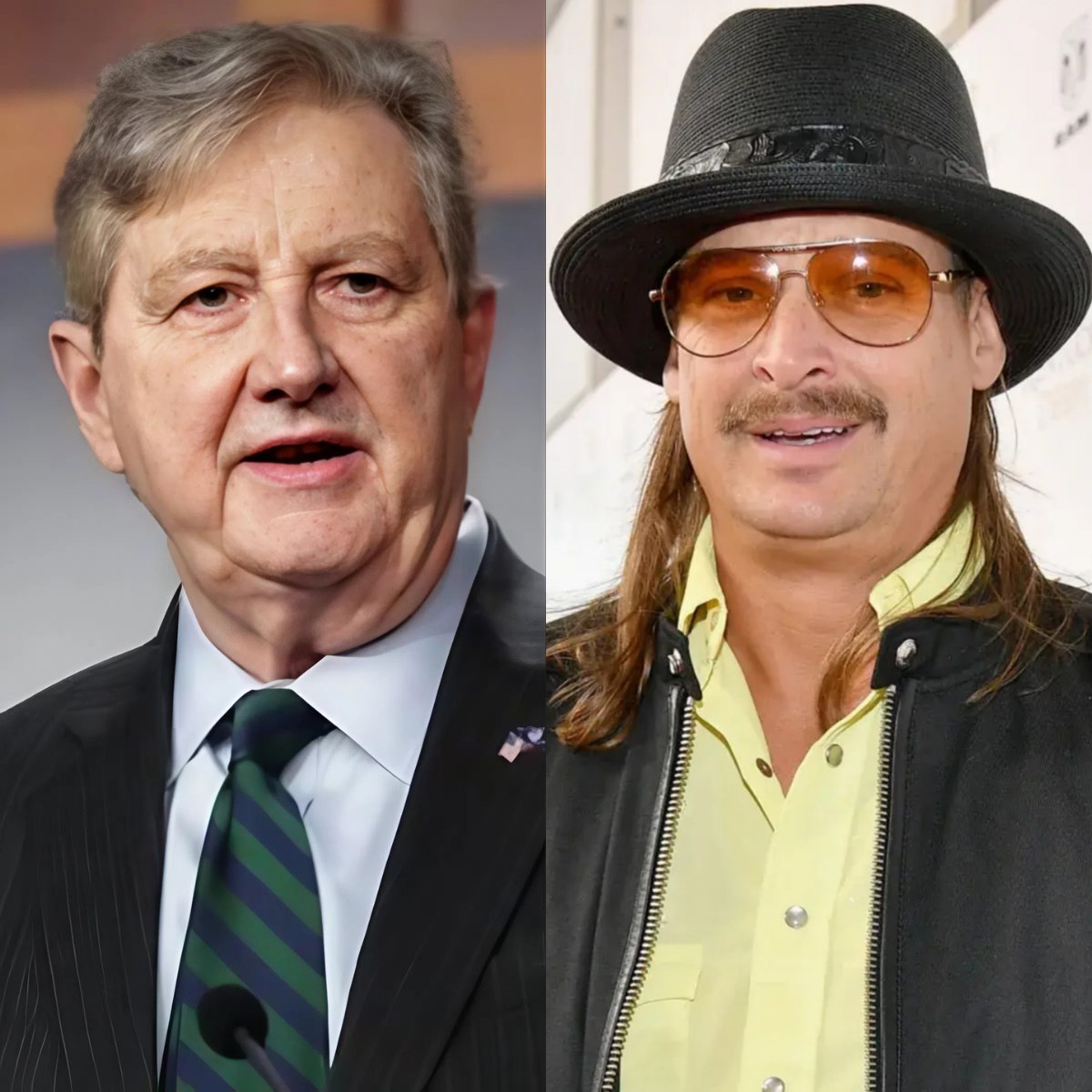
In a moment destined to be replayed, dissected, and weaponized across every corner of the internet, a heated on-air exchange between Senator John Kennedy and musician Kid Rock has ignited a nationwide debate on patriotism, free speech, and the soul of American identity.
Broadcast live on a prime-time cable news special titled “America in the Balance,” what began as a moderated conversation about American culture spiraled into one of the most explosive clashes in recent political-celebrity memory — a verbal detonation that sent shockwaves through social media platforms and cable news cycles.
The flashpoint? Kennedy’s forceful directive that Kid Rock, if he no longer believed in America’s core values, ought to “leave the country.”
The moment froze the studio, stunned the audience, and within minutes, became the most replayed clip of the week. But beneath the fireworks lies a deeper question: what does patriotism mean in a polarized America, and who gets to define it?

The Confrontation
The discussion was already simmering with ideological tension before it boiled over. Kennedy, known for his folksy Southern cadence and sharp-edged conservative rhetoric, spoke passionately about what he saw as a disturbing trend: entertainers profiting from America while publicly criticizing it.
Kid Rock — the swaggering, gravel-voiced rocker-turned-cultural-commentator — pushed back, insisting that love for one’s country requires honesty, even when that honesty is uncomfortable.
Then came the viral lightning strike.
“If you think America’s so bad,” Kennedy fired, leaning forward, voice rising with a Louisiana drawl sharpened into steel, “then maybe you should leave.”
The sentence hung in the air like a thunderclap.
A freeze-frame silence followed — one of those rare live-television moments where even seasoned anchors forget to breathe. Kid Rock, typically the first to return fire, sat momentarily stunned. The man who built his brand on rebellious patriotism and unfiltered speech suddenly found himself cast as the accused rather than the defender of American pride.
The show host, visibly startled, attempted to smooth the moment, but the cultural fuse had already been lit.
A Nation Responds — Loudly
Clips of the encounter hit social media before the commercial break even finished. Twitter (or “X,” depending who you ask), Facebook, TikTok, and every political subreddit erupted.
Supporters of Kennedy praised his bluntness.
“He finally said what millions of Americans think but aren’t allowed to say,” one commenter wrote.
“Patriotism is loyalty, and loyalty matters.”
Others saw the comment as authoritarian posturing disguised as patriotism.
“So criticizing the government = exile? That’s not democracy, that’s dictatorspeak,” another user countered.
Some were amused, viewing the entire saga as a surreal collision between two loud, flag-waving corners of American culture — both claiming ownership over patriotism. Memes flooded timelines within hours: Uncle Sam facepalming, photoshopped eagle tears, patriotic bald eagles holding popcorn buckets. America laughed — and argued — all at once.

The Irony
The controversy carries a twist that almost feels scripted. Kid Rock is one of the entertainment industry’s most vocal patriotic figures. His music, particularly songs like “Born Free,” revels in American pride and individual liberty. He is known for charity work supporting veterans and first responders. He has performed for troops overseas and repeatedly aligned himself with the ideals of duty and sacrifice.
And yet, here he was — being called out as un-American by a U.S. Senator.
Kennedy, for his part, made a calculated rhetorical move. His statement was not simply a challenge to Kid Rock; it was a direct appeal to voters who view patriotism not as a spectrum but as a loyalty test. In modern American politics, symbolic conflicts can matter as much as policy — sometimes more.
Patriotism in the Crossfire
This fictional clash reveals something raw and real about the American psyche. Patriotism, once assumed to be a foundational value shared across political lines, has become a battleground word.
Is patriotism unwavering celebration of the nation’s strengths?
Or is patriotism the courage to call out its flaws in hopes of improvement?
One philosophy sees criticism as betrayal.
The other considers silence the true disloyalty.
And in a country where both freedom and loyalty sit at the core of its identity, these two visions are destined to collide.
Free Speech and Cultural Power
The argument also dances along the edge of a central American paradox: the right to free expression.
Kid Rock’s defenders argue that artistic rebellion is practically woven into the nation’s DNA — from protest folk songs to hip-hop activism, from punk anthems to Vietnam-era rock. “Telling someone to leave because they critique the country is the opposite of freedom,” one cultural critic wrote in an op-ed following the incident.
Kennedy supporters pushed a different narrative: free speech comes with civic responsibility. A nation, they say, cannot hold together if those who benefit most from its opportunities use their platforms to undermine confidence in it.
In truth, both arguments orbit the same gravity center — anxiety over America’s future direction.

A Culture War Flashpoint
Within 48 hours (fictionally speaking), the exchange was not just a viral moment — it had become a Rorschach test for American political identity.
Late-night hosts joked about it. Political commentators pontificated. Hashtags erupted:
#LoveItOrLeaveIt
#PatriotOrPunk
#FreeToDisagree
Fan forums, military blogs, and music podcasts all weighed in. Meanwhile, artists across genres — country icons, rappers known for political lyrics, indie singers who normally avoid culture wars — suddenly found microphones in their faces.
Even corporate accounts chimed in, some playing neutral patriotism bingo: “We believe in freedom, unity, and choice. Also limited-edition flavor drops this Friday.”
Democracy, in the digital age, always travels with merch.
Meanwhile, the Real Question Lingers
Strip away the noise and theatrics, and what remains is a question that has haunted this country since its founding.
What does loving America actually mean?
Is love loyalty, no matter what — the proud salute, the flag raised high, the anthem sung loud enough to shake stadium rafters?
Or is love honesty — the push to fix what’s broken, the willingness to demand better, the courage to call out hypocrisy even at personal cost?
Perhaps the truth lies somewhere between fireworks and protest marches. Perhaps American patriotism is not a single stance but a duel of duties: pride and conscience, loyalty and liberty.
And perhaps this fictional Kennedy-Kid Rock clash simply dramatizes a battle that has always lived in the American heart.
Conclusion: Beyond the Viral Clip
In reality, this moment — fictional though it is — captures the mood of a nation standing at a philosophical crossroads.
Some Americans fear that criticism erodes unity.
Others fear that silencing dissent erodes freedom.
Both sides, oddly enough, believe they are defending the republic.
Whether this imaginary confrontation becomes a symbolic lesson or just a viral firework lost in the scroll of time, it exposes something undeniable: America is still arguing not just over policy, but over identity itself.
And that argument, noisy and uncomfortable as it may be, might be the most American thing of all.
As debates rage, one quiet truth hums beneath the chaos like a heartbeat:
A country that still fights over what patriotism means is a country still fighting to define itself — and to care about its future.



